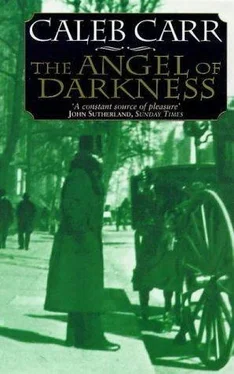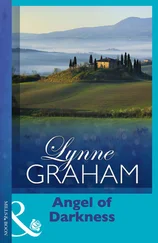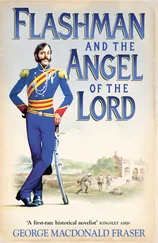Caleb Carr - The Angel Of Darkness
Здесь есть возможность читать онлайн «Caleb Carr - The Angel Of Darkness» весь текст электронной книги совершенно бесплатно (целиком полную версию без сокращений). В некоторых случаях можно слушать аудио, скачать через торрент в формате fb2 и присутствует краткое содержание. Жанр: Детектив, на английском языке. Описание произведения, (предисловие) а так же отзывы посетителей доступны на портале библиотеки ЛибКат.
- Название:The Angel Of Darkness
- Автор:
- Жанр:
- Год:неизвестен
- ISBN:нет данных
- Рейтинг книги:5 / 5. Голосов: 1
-
Избранное:Добавить в избранное
- Отзывы:
-
Ваша оценка:
- 100
- 1
- 2
- 3
- 4
- 5
The Angel Of Darkness: краткое содержание, описание и аннотация
Предлагаем к чтению аннотацию, описание, краткое содержание или предисловие (зависит от того, что написал сам автор книги «The Angel Of Darkness»). Если вы не нашли необходимую информацию о книге — напишите в комментариях, мы постараемся отыскать её.
The Angel Of Darkness — читать онлайн бесплатно полную книгу (весь текст) целиком
Ниже представлен текст книги, разбитый по страницам. Система сохранения места последней прочитанной страницы, позволяет с удобством читать онлайн бесплатно книгу «The Angel Of Darkness», без необходимости каждый раз заново искать на чём Вы остановились. Поставьте закладку, и сможете в любой момент перейти на страницу, на которой закончили чтение.
Интервал:
Закладка:
Canfield’s Casino was a square, mansionlike building located down in a green, shady park where the Congress Spring (one of the town’s many old mineral water fountains) had formerly been the main attraction. The Casino had actually been built by another famous gambler, John Morrissey, a burly Irish prizefighter and Tammany tough who’d made use of his winnings to set himself up in the gaming room and horse track businesses (Morrissey’d also built Saratoga’s first track). During the construction in 1870-1871 of what’d then been known as “the Club House,” Morrissey’d pumped every Italianate luxury he could think of into the place, and it’d done a booming business from the start. It hadn’t been enough, though, to net Morrissey the prize he wanted most: acceptance by the society types who came to fritter their dollars away by the thousands in his establishment. He’d died in 1878, and ownership of the joint had passed around to various second-rate operators for a time, until it was bought and refurbished in 1894 by its current owner, Richard Canfield.
Canfield, like Morrissey, had made a personal fortune in the gambling trade, though he didn’t have the thug’s past what’d kept Morrissey from ever being treated like a true gentleman. Having run gaming houses in Providence, Rhode Island, and then in New York, Canfield had spent his spare time (and a short prison term) turning himself into a kind of self-taught scholar and art critic. When he took over Morrissey’s Club House, he put all his learning to work, filling the joint with top-of-the-line furniture and art, building a big new gourmet dining room and hiring one of the most famous French chefs in the world to cook for his patrons. And by refusing to allow women and kids to play at his tables, he’d even outsmarted the reformers who, for a short time during his early days of operation, had tried to shake things up in Saratoga and had actually succeeded in getting a lot of other, smaller houses closed down. At the same time, though, Canfield had built said women and children a nice big lounge where they could amuse themselves with ices and entertainments-and tell their husbands and fathers what bets to put down for them.
The park around the Casino was a suitable setting for all this luxurious recreation, with its fountains, pools, statues, and handsome trees lining the walkway to the ivy-covered walls of the three-story Casino. We entered the building that night through the front door, the detective sergeants noting with relief that Mr. Canfield was one of the few gaming house and hotel operators in Saratoga who didn’t hang a “Jewish Patronage Not Solicited” sign outside his establishment. Once in, we found ourselves in a large, crowded, and thickly carpeted lobby what was just outside the public gaming room. Inside this room the stakes were low (white chips went for a dollar, red for five, blue for ten, yellow for a hundred, and brown for a thousand) compared to what went on in the private rooms upstairs, where everything was multiplied by a hundred.
Antsy as I was to start playing, I have to confess that I was even more anxious, that night, to meet the man who was famous everywhere as “the Prince of Gamblers.” I didn’t have long to wait: as soon as we walked in I caught sight of a fleshy but knowledgeable-looking soul, clean-shaven, with dark eyes that took in everything what was going on around him. (The face was so fascinating that it eventually snagged the interest of no less a painter than Mr. J.A.M. Whistler, who reproduced it on canvas.) When said face observed Mr. Picton’s entrance, it and the rest of the man hurried on over, putting a hand out in happy greeting.
“Well, Mr. Picton!” Mr. Canfield said. “Feeling up to a night at the tables, are you? Or is it just Columbin’s cooking that brings you up?”
“Canfield!” Mr. Picton said, with heartfelt good cheer. “No, I have some houseguests for a time, and I told them they couldn’t leave the county without seeing our greatest contribution to modern American culture!” Mr. Picton made a quick round of introductions, and Mr. Canfield greeted us all in the smooth way what marks the successful gambling magnate. But there was something more in it, too; it seemed like the simple fact that we were Mr. Picton’s guests meant that we’d get some kind of special treatment.
“Mr. Picton was a big help at a particularly dicey time,” Mr. Canfield explained, as if he could hear the thought what was in my head. “During the town’s nasty little reform fit, he argued to the county that Saratoga could shut down all the smaller houses it wanted to, but that it had to let ‘establishments of quality’ like the Casino stay open-unless it wanted to go back to depending on mineral water for its livelihood.”
“I don’t know that I was quite so instrumental, Canfield,” Mr. Picton said. “Even the staunchest of the reformers eventually saw that they were cutting their own throats. How’s the crowd tonight?”
“Oh, they’re all here,” Mr. Canfield answered, starting to walk us toward the dining room. “Brady, Miss Russell, Jesse Lewisohn-and Gates is upstairs, still determined to set a record.”
This lineup had me speechless: the names of Diamond Jim Brady, the railroad supply magnate with a stomach six times normal size and an appetite for food that was almost as big as his lust for precious stones, and Miss Lillian Russell, the famous entertainer and Brady’s constant companion, were, of course, well known to the world at large back then, as they still are; but in gambling circles, the names of Jesse Lewisohn-“the sporting banker”-and Mr. John Gates (who’d soon earn the nickname “Bet-a-Million” for losing and then winning back almost that sum-all in one day-at Saratoga) were just as legendary, and cause for even greater excitement.
“Brady’s in the dining room, of course,” Mr. Canfield went on. “Been through half of Columbin’s stock already, and he’s calling for more. I’ll get you a table away from him-even with the diamonds, he doesn’t do much for other people’s appetites at moments like this.” Signaling to a waiter at the entrance to the dining room, Mr. Canfield shook Mr. Picton’s hand again. “Albert’ll take care of you all-I’ll see you in the gaming room. I assume you won’t want any action upstairs?”
Mr. Picton shook his head with a smile. “On my salary? Not a prayer, Canfield. We can injure ourselves quite sufficiently in the public room, thanks.”
Mr. Canfield paid his respects to the rest of us and then started to disappear back into the crowd; but then, seeming to remember something, he stopped.
“Oh, by the way, Picton. Word’s going around that you’re going to reopen that case-the one where the kids got shot?”
The rest of us couldn’t do much to hide our surprise; but Mr. Picton just smiled and shook his head.
“All right, Canfield,” he said. “I’ll try to keep you posted.”
“You know how it is,” Mr. Canfield answered with a respectful shrug. “People in this town’ll bet on anything, and do-there’s bound to be a line on the manhunt and the trial. I’d just like to be able to set some reasonable odds.”
“Two to one on the manhunt, for now,” Mr. Picton answered. “As for the trial, I’ll let you know.”
Mr. Canfield gave that what you might call an appreciative look. “Two to one? Confident.”
“Confident,” Mr. Picton said. “Though who we actually arrest may surprise you.”
Mr. Canfield nodded, turned, and, with another signal of departure, went back to his business of making suckers happy.
“And that, my friends,” Mr. Picton said, “is what I mean about word traveling fast in these towns.”
“Do you mean to say they’re going to bet on this case?” the Doctor asked, taking in the wealthy crowd and starting to look a little revolted.
Читать дальшеИнтервал:
Закладка:
Похожие книги на «The Angel Of Darkness»
Представляем Вашему вниманию похожие книги на «The Angel Of Darkness» списком для выбора. Мы отобрали схожую по названию и смыслу литературу в надежде предоставить читателям больше вариантов отыскать новые, интересные, ещё непрочитанные произведения.
Обсуждение, отзывы о книге «The Angel Of Darkness» и просто собственные мнения читателей. Оставьте ваши комментарии, напишите, что Вы думаете о произведении, его смысле или главных героях. Укажите что конкретно понравилось, а что нет, и почему Вы так считаете.











